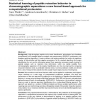Free Online Productivity Tools
i2Speak
i2Symbol
i2OCR
iTex2Img
iWeb2Print
iWeb2Shot
i2Type
iPdf2Split
iPdf2Merge
i2Bopomofo
i2Arabic
i2Style
i2Image
i2PDF
iLatex2Rtf
Sci2ools
BMCBI
2007
2007
Statistical learning of peptide retention behavior in chromatographic separations: a new kernel-based approach for computational
Background: High-throughput peptide and protein identification technologies have benefited tremendously from strategies based on tandem mass spectrometry (MS/MS) in combination with database searching algorithms. A major problem with existing methods lies within the significant number of false positive and false negative annotations. So far, standard algorithms for protein identification do not use the information gained from separation processes usually involved in peptide analysis, such as retention time information, which are readily available from chromatographic separation of the sample. Identification can thus be improved by comparing measured retention times to predicted retention times. Current prediction models are derived from a set of measured test analytes but they usually require large amounts of training data. Results: We introduce a new kernel function which can be applied in combination with support vector machines to a wide range of computational proteomics problems. ...
| Added | 12 Dec 2010 |
| Updated | 12 Dec 2010 |
| Type | Journal |
| Year | 2007 |
| Where | BMCBI |
| Authors | Nico Pfeifer, Andreas Leinenbach, Christian G. Huber, Oliver Kohlbacher |
Comments (0)

